iHeartDogs is reader-supported. When you buy via links on our site, we may earn an affiliate commission at no extra cost to you.
The best dog foods for allergies are ideal if you have a sensitive pup. Some dogs may have dangerous reactions to common ingredients, which can make finding the right diet tricky. Luckily, there are plenty of allergy-friendly options on the market to help you find a healthy choice.
Finding the Best Dog Food for Allergies
In this article, we’ll discuss 12 of the best dog food brands for canines with allergies and sensitivities. These foods are less likely to make your dog suffer from allergic reactions.

Symptoms of Food Allergies in Dogs
Dog food allergy symptoms aren’t always obvious. Some dogs will show severe reactions right away while others will develop gradual reactions that you may not notice when starting the new food.
Here are a few signs that your dog may be exposed to a food allergy:
- Itchy skin
- Red skin
- Hair loss
- Digestive problems, like vomiting or diarrhea
- Weight loss
- Lethargy
- Ear infections
These are just a few of the many signs that a dog is allergic to something. If you notice unusual symptoms after transitioning your dog to new food, an allergy may be to blame. However, it’s always a good idea to talk to your vet before coming to a conclusion.
Common Dog Food Allergens
Dogs can be allergic to almost anything in their foods. Some dogs are born with allergies while others develop them over time. Yet, some foods are more likely to cause reactions than others.
Here are a few common dog food allergens:
- Beef
- Chicken
- Dairy
- Eggs
- Soy
- Gluten
So, if you’re unsure what your dog is allergic to, it’s best to avoid dog foods with those ingredients.
Best Dog Foods for Allergies
Below are a few of the best dog foods for allergies because they avoid common allergens in dogs while still being healthy and tasty.
1. Zignature
Zignature is a brand that specializes in limited-ingredient dog food, including kibble and canned dog food products. The company has short ingredient lists for its food, and it avoids common allergens like chicken, beef, and grains. They keep the number of carbohydrates to a minimum, and instead, they focus on a meat-first formula to ensure your dog gets plenty of protein.
Even without using chicken or beef as primary proteins, Zignature still has a long list of flavor options, including lamb, duck, turkey, goat, salmon, catfish, and venison. So, if your dog is allergic to a protein, there’s no shortage of other options. The food doesn’t contain any additional proteins besides the ones listed on the packaging to avoid any unexpected reactions. These foods are designed for dogs of all breeds and life stages.
Benefits:
- Avoids common allergens
- Single protein source
- Wide variety of recipes
- Easy to serve
- Dry or canned food available
2. Ollie
Ollie is another fresh dog food brand that personalizes its recipes for your dog’s needs. To get started, you need to fill out a questionnaire similar to Nom Nom’s. It asks about your dog’s age, weight, breed, activity level, and allergies. Then, it recommends a fresh food recipe that caters to their needs. So, if you mark that your dog has allergies, the company will suggest the most allergy-friendly recipe for your furry friend.
In the food, you can see whole pieces of quality ingredients so you’ll know exactly what’s going into your dog’s mouth. The food ships right to your door on a regular schedule. The packages are kept cold and are ready to serve. Your first order will come with items to help you get started, including a feeding guide to make sure you properly transition your dog’s food. The ingredient list is short to ensure it only includes key ingredients for your pet’s diet.
Benefits:
- Personalized for your dog
- Fresh food with quality ingredients
- Shipped to your door
- Starter kit comes with free items like a scoop and storage container
- Good for picky eaters
- iHeartDogs Offer: 60% off first box
3. Nom Nom
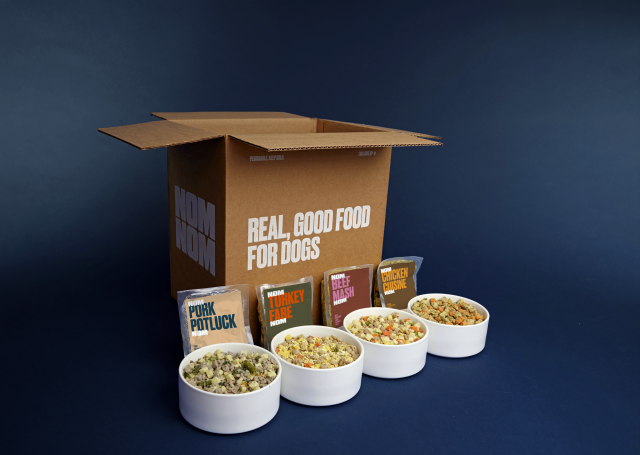
Nom Nom Fresh Dog Food stands out as an exceptional choice for dogs with allergies, thanks to its use of high-quality, hypoallergenic ingredients and customizable meal plans. Each recipe is made with fresh, natural ingredients that include real meat and fresh veggies, thereby minimizing exposure to common allergens found in many commercial dog foods. The company also ensures transparency about their ingredients, making it easier for pet parents to avoid known allergens.
Nom Nom’s commitment to providing personalized meal plans means that each dog’s unique dietary requirements are taken into account. This attention to detail is invaluable for dogs with allergies. Furthermore, the meals are portioned and shipped in insulated, recyclable packaging to ensure they arrive fresh at your doorstep.
All of these elements make Nom Nom a convenient, reliable, and nutritious option for dogs with allergies, transforming mealtimes from a potential hazard into a pleasure for your pet.
Benefits:
- High-quality, restaurant quality, natural ingredients minimize allergen exposure
- Full transparency on ingredients assists pet parents in avoiding known allergens
- Four delicious recipes: Beef Mash, Chicken Cuisine, Turky Fare, and Pork Potluck
- Customizable meal plans cater to individual dietary needs
- Meals are shipped fresh in insulated, recyclable packaging for utmost convenience
- Supports improved digestion and overall health in dogs with allergies
- Vet-crafted meals guarantee balanced nutrition
4. Canidae Pure Limited Ingredient
Canidae has a few limited ingredient formulas, but the Salmon & Sweet Potato recipe is one of the most popular. It’s a great alternative for dogs that are allergic to more common proteins like chicken and beef. All the limited ingredient formulas are made with ten key ingredients or fewer to reduce the risk of allergic reactions in dogs.
This food doesn’t contain any grains or artificial colors, flavors, and preservatives. Instead, it’s packed with antioxidants and probiotics to support healthy digestion and immune systems. The first few ingredients are animal protein, followed by more ingredients that are recognizable to dog parents. Thus, you can feel comfortable giving your dog this food by simply looking at the label.
Benefits:
- Ten key ingredients or less
- Avoids common allergens
- High in protein
- Good for the digestive and immune systems
- Easy to serve
5. Taste of the Wild Limited Ingredient
Taste of the Wild offers a wide range of recipes, but their limited ingredient options are the best dog foods for allergies. These formulas only use four key ingredients to limit the number of ingredients that could cause allergies. Real animal protein is the first ingredient, and the food has a high protein percentage to mimic your dog’s ancestral diet.
There are a few different limited ingredient formulas to choose from, including turkey, trout, and Angus beef. The main ingredients are paired with micronutrients and omega fatty acids to keep your dog’s coat healthy and to make the food easier to digest. You won’t find any grains or artificial colors, flavors, and preservatives added to this food. It’s packed with quality ingredients while still being in the convenient form of kibble.
Benefits:
- High in protein
- Only has four key ingredients
- Avoids some common allergens
- Good for digestion
- Convenient
6. Natural Balance Limited Ingredient Diets
Natural Balance is another brand of dry dog food that offers limited ingredient options. The ingredient lists only include a few premium items, including one animal protein source and healthy grains. They avoid soy, gluten, artificial colors, and artificial flavors. The first ingredient is always real animal protein.
This dog food comes in several formulas, including duck, lamb, chicken, beef, and salmon. So, you can choose the recipe that avoids the proteins your dog is sensitive to. Each recipe is packed with essential nutrients to promote a healthy immune system. However, since this food has some grains in it, it’s not allergy-friendly if your dog is sensitive to grains.
Benefits:
- Only uses a few premium ingredients
- Avoids some common allergens
- Lots of recipes to choose from
- Good for the immune system
- Easy to serve
7. Merrick Limited Ingredient
Merrick has several limited ingredient options, so there’s something that caters to every sensitive dog. The formulas are lamb, salmon, or chicken, and you can choose recipes with or without grains, depending on your dog’s needs. All the options only have a single source of animal protein and they avoid common allergens like corn and soy.
The food is crafted to be easily digestible for even the most sensitive dogs. If you look at the ingredient list, you’ll see animal protein listed first, followed by recognizable ingredients that you can feel good about giving your dog. It only has ten key ingredients to reduce the risk of allergic reactions in dogs.
Benefits:
- Only ten key ingredients
- Can get it with or without grains
- Doesn’t include some common allergens
- Good for digestion
- Convenient
8. JustFoodForDogs
JustFoodForDogs offers a wide selection of fresh dog food recipes that you can access without having to fill out a questionnaire. However, if you want assistance, you can take advantage of the dog feeding calculator on the website. They sell the food frozen, in ready-to-serve packages, or in DIY packages that allow you to make the food yourself. You can look at the ingredient lists to decide which one is compatible with your dog’s dietary needs.
All options are great for dogs with allergies because they have a wide range of products that have visible chunks of healthy ingredients in them. So, you can feel confident about what’s going into your dog’s mouth. A few of the many recipes are chicken & white rice, fish & sweet potato, venison & squash, lamb & brown rice, and beef & russet potato. You can also purchase variety packs so your dog can sample multiple foods.
Benefits:
- Fresh food with quality ingredients
- Wide range of recipes
- Avoids unhealthy ingredients
- Website has a helpful feeding calculator
- Good for picky eaters
- iHeartDogs Offer: 35% off your first auto-ship order
9. The Honest Kitchen
The Honest Kitchen offers unique types of dog food using human-grade ingredients. Their most popular line is their dehydrated recipes, but they also offer dry and wet food. To serve the dehydrated food, all you have to do is add water, stir, and let it sit for a few minutes. Then, the food is rehydrated and ready to feed to your furry friend. They sell options with or without grain.
The recipes contain a single protein, along with fruits and vegetables that contain essential nutrients for your dog. There are a lot of recipes available, including ones with chicken, turkey, beef, and fish. All the ingredients are thoughtfully sourced to make sure they’re safe and delicious for dogs.
Benefits:
- Variety of options
- Can buy it with or without grains
- Avoids some common allergens
- Good for picky eaters
- iHeartDogs Offer: 30% off orders $30+ with the code IHEARTDOGS30
10. Acana Singles Limited Ingredient
Acana’s Singles kibble formulas have limited ingredients to cater to dogs with allergies. They each have a single protein, which can either be duck, beef, lamb, or pork. Customers can also choose between grain-free formulas or ones with wholesome grains. Acana never uses artificial flavors, colors, or preservatives in its foods, and the company doesn’t include common allergens like corn, soy, and wheat.
The first three ingredients come from quality animal protein, and they’re followed by whole fruits and vegetables. 65% of the food is animal ingredients while 35% is fruits and vegetables. Thus, this food is high in protein because it’s designed to mimic a dog’s ancestral diet. The food is also rich in fiber to help dogs digest it better.
Benefits:
- Avoids common dog food allergens
- Comes with or without grains
- High in protein
- Easy to digest
- Convenient
11. The Farmer’s Dog
The Farmer’s Dog is a company that creates customized meal plans of fresh dog food. Customers start by taking a few minutes to fill out a survey, which asks about your dog’s breed, age, activity level, ideal weight, and sensitivities. Then, the company will create a recipe that caters to your dog’s needs, so you can feel confident knowing it won’t contain any of your dog’s allergies.
The food is shipped to your door on a regular schedule. The food will be frozen upon arrival and must be thawed before you can serve it to your dog. With these fresh food formulas, you can see exactly what ingredients are in the food. The formulas only use ingredients that are essential to your dog’s diet, including meat, vegetables, fiber-rich foods, and nutrients.
Benefits:
- Personalized for your dog
- Shipped to your door
- Fresh food with quality ingredients
- Good for digestion
- Good for picky eaters
12. Blue Buffalo Basics
This Blue Buffalo recipe is perfect for senior dogs that have food sensitivities. It’s a turkey and potato recipe that uses a single animal protein source, followed by fruits and vegetables, such as pumpkin to aid digestion. This food also includes glucosamine and chondroitin for joint support.
Like other limited-ingredient diets, this food avoids common allergies in dogs, such as chicken, beef, corn, wheat, soy, dairy, and eggs. Instead, the formula is full of a blend of antioxidants, vitamins, and minerals specifically to help older dogs. If your dog isn’t a senior or if they’re allergic to turkey, there are a variety of other Blue Buffalo Basics formulas that are made with different proteins and for dogs of different life stages.
Benefits:
- Good for senior dogs
- Avoids the common dog food allergies
- Promotes healthy digestion
- Convenient
- Variety of other limited ingredient formulas available
Features of Best Dog Foods for Allergies
If you’re looking for one of the best dog foods for allergies, these are some aspects you should consider.
Limited Ingredients
Many allergy-friendly dog food recipes are labeled as “limited ingredient diets.” That’s because fewer ingredients mean fewer chances of an allergic reaction. Limited ingredient formulas only include a few essential ingredients that your dog needs, and they avoid any unnecessary fillers. Plus, they focus on one protein source.
Necessary Nutrients
Having fewer ingredients is the key to allergy-friendly dog food, but the food still needs to be healthy for your dog. Quality dog food should include nutrients that can benefit all areas of your dog’s health, especially their digestion, immune system, joints, and coat.
High in Protein
Another way to narrow down your search is to focus on which limited-ingredient diets have enough protein for your dog. Products that are high in real animal protein are beneficial for your pup and often more appealing.
Flavor
Flavor can matter just as much as ingredients when picking out food. Even if you choose the healthiest food in the world, it won’t benefit your dog if they won’t eat it. So, if you have a picky eater, make sure you choose a food that’s appealing to them.

Frequently Asked Questions about Food for Dogs with Allergies
If you’re having trouble deciding on a new brand of dog food, here are some questions and answers that may help.
1. What Foods Should Hypoallergenic Dogs Avoid?
Dogs needing a hypoallergenic diet due to allergies or intolerances should avoid consuming all common allergens. Sticking to a hypoallergenic diet can mitigate the risk of developing an allergic reaction.
While some dog or pet owners invest in testing to learn more about their dog’s allergies, some don’t have the funds or desire. Whether you have suspension or proof your dog needs hypoallergenic dog food, you can change their diet to avoid ingredients that may cause a reaction. If you plan to make hypoallergenic dog food, set aside enough time to plan out the process. From shopping for ingredients to making food, preparing your own hypoallergenic dog food can be time-consuming. Alternatively, many trusted brands on the market offer hypoallergenic dog food.
If your dog’s taste palette isn’t aligning with the hypoallergenic food you’ve chosen, you may want to try a food topper to wet their appetite. Additionally, food toppers can provide your dog with nutrients to promote a longer, healthier life.
2. What Are The Top 7 Most Common Food Allergens For Dogs?
While the list of foods that can trigger a reaction in your dog is long, seven common ingredients are most likely to trigger an allergic reaction. It is possible for a dog to be allergic to one, several, or all ingredients on this list (although it is rare to be allergic to all).
Here are the food allergens for dogs that are among the most common:
- Beef: While beef is a very good source of protein, it is a top allergen for our canine friends. Symptoms of a beef allergy in dogs can range from digestive upset to respiratory problems.
- Chicken (including eggs): Although chicken is a common culprit in causing skin-related allergic reactions in dogs, reactions may manifest differently.
- Wheat: Wheat serves as a popular carbohydrate among many different dog foods. Reactions may vary but commonly present as skin problems or digestive issues.
- Dairy: Just as humans can have a lactose intolerance, dogs can be susceptible to dairy allergies or intolerances.
- Corn: Corn is another common carbohydrate source in popular dog foods.
- Soy: Soy is a source of protein that is derived from plants. Dogs with a soy allergy may experience digestive issues, skin problems, and more.
- Artificial flavors and preservatives: Preservatives are commonly added to dog food to extend its shelf life. Some of the most common, butylated hydroxytoluene and butylated hydroxyanisole, can cause serious reactions in some dogs. Artificial flavors are also a common allergen in which symptoms can manifest differently based on the severity of a dog’s allergy.
3. Is Grain-Free Good For Dogs With Allergies?
Grain-free dog food can be good for dogs with allergies – especially if they are allergic to grains. Allergies or not, grain-free dog food can offer benefits such as better digestion, skin and cost, increased energy, and nutritional balance. To determine what type of diet is best for a dog with allergies, it’s extremely helpful to pinpoint what they are allergic to.
Often, allergies can be to proteins such as chicken, beef, or eggs. In this case, swapping to a grain-free diet may not reduce allergic reactions. Additionally, some grain-free dog foods swap grains such as corn or wheat with other ingredients like lentils or potatoes. If a dog is allergic to any of the ingredients that are used in place of grains, a grain-free diet may work against you. This further proves the importance of learning about your dog’s allergies. It is always advised to consult your dog’s veterinarian to determine the best dog food for their allergies.
4. What Meat Is Good For Dogs With Skin Allergies?
The best dog food for skin allergies will be dependent on your dog and their individual immune and digestive systems. However, some meats may be less likely to trigger or worsen a skin reaction.
While common proteins (meat) such as chicken and beef rank high on the allergen list, there are others that are more allergy-friendly. The best dog food for skin allergies may contain meats such as:
- Fish: Fish often contains healthy amounts of Omega 3 fatty acids, which is a natural anti-inflammatory. This can be beneficial for dogs with skin allergies.
- Venison: Venison, or deer meat, can be less likely to trigger allergic reactions than most other protein sources.
- Turkey: Turkey is what’s called a novel protein. In other words, it is a less common protein source. This makes the chances of previous exposure slim, meaning their immune system is less likely to produce a reaction.
- Duck: Duck can be a great choice for dogs with skin allergies. In fact, duck is considered a hypoallergenic protein. Additionally, duck meat is rich in omega-3 fatty acids, which is helpful for dogs experiencing skin inflammation.
5. Can Food Cause Itchy Skin In Dogs?
Not only can food cause itchy skin in dogs, but skin issues are one of the most common presentations of allergies among canines. Allergies to certain ingredients in dog food can cause itchy skin, hives, rash, and more. If your dog is experiencing skin-related symptoms (or smells), it may be due to food allergies. You should discuss an elimination diet with your vet to pinpoint specific ingredients to avoid.
6. How Can I Tell If My Dog Is Allergic To His Food?
Food allergies can present in many ways. It’s important to pay extra attention to your dog after switching foods so that any food allergies can be addressed early on. Symptoms can range in severity from minor skin irritations to respiratory distress. Severe and life-threatening allergies are extremely rare but can happen. More commonly, though, food allergies can present as:
- Itchy skin: If your dog has itchy skin due to a food allergy, you may notice them licking excessively, scratching, or biting at their skin.
- Ear infection: Recurring ear infections could be a red flag that their immune system disagrees with something in their diet. If your dog has an ear infection, you may notice that they are scratching or shaking their head often, and their ear canal may appear red.
- Gastrointestinal issues: Vomiting, diarrhea, excessive gas, or other stomach problems can signal a food allergy.
There are many ways a dog’s allergies may present. Speaking with your vet and closely monitoring your dog’s symptoms are the best ways to determine any possible food allergies. The best dog food for allergies will be dependent on your dog’s individual needs and restrictions.
7. What Foods Make Dogs Itchy?
Every dog is unique, and food allergies are as personal as any other aspect of their health. If itchy skin is a symptom of a food allergy for your dog, unfortunately, there is no sure way to know right off the bat what food may be causing the issues.
Elimination diets are an effective way to narrow down what your dog may be reacting to. It is important to note that other issues may cause itchiness in dogs as well. If your dog is scratching or biting excessively, check carefully for fleas, ticks, or an infection of the skin. Also, ask yourself if your dog has been exposed to any external allergens or irritants, such as a new skin or coat product, new dog shampoo, or a new laundry soap when washing their bedding. If you can confidently rule out all of the above, your dog’s itching could very well be due to a food allergy.
8. What Non-Meat Protein Is Good For Dogs With Allergies?
The best food for dogs with allergies can sometimes contain non-meat proteins. Non-meat proteins are vegan, plant-based protein sources that provide the nutrients that your dog needs – without any meat.
- Fava beans: Fava beans are a nutrient-dense source of vegan protein containing fiber, vitamins, and minerals such as manganese and copper. Fava beans are also low in fat, making them a good source of protein for dogs who may be above their recommended weight range. It is important to note that unprepared Fava beans (with their tough outer skin) could be harmful to dogs. Fava beans must be cooked thoroughly to be included in a canine diet.
- Quinoa: When cooked, quinoa is easy to digest and considered a low-allergenic food. Quinoa is a good meat-free source of protein, fiber, vitamins, and minerals.
- Millet: Millet is a gluten-free and easily digestible source of non-meat protein that is perfectly safe to include in a canine diet.
The specific dietary needs of hypoallergenic dogs can vary, so consulting with a veterinarian is important. Your dog may need a diet tailored to their needs to promote a healthier life for your fur baby. And don’t forget about the fur babies that are waiting for a fur-ever home. iHeartdogs sure doesn’t. Shop our website online and help us give back to dogs needing proper care and love.
9. How Should You Transition Your Dog to New Food?
Whenever you switch your dog to a new food, it’s a good idea to do a gradual transition, especially if your dog has a sensitive stomach. Here is our recommended transitioning process:
- Days 1 to 3: Serve 80% old food with 20% new raw food
- Days 4 to 7: Serve 50% old food with 50% new food
- Days 7 to 14: Serve 20% old food with 80% new food
- Day 15: 100% new food
However, every dog is different, so you can do a faster or slower transition depending on how your dog responds to new food.
10. Is Grain-Free Food Better for Dogs with Allergies?
If your dog has a grain allergy, grain-free food is definitely healthier for them. However, if your dog has never had a reaction to grains, it’s safe to include them in your dog’s new diet. Instead, focus on finding a formula that doesn’t include your dog’s allergy.
11. Is it Okay for Dogs to Eat the Same Food Every Day?
Yes, it’s fine for dogs to eat the same food every day. Dogs have fewer taste receptors than humans, so they don’t crave as much variety in their diets. Yet, if you’re worried your dog is bored of their food, you can try switching between different formulas of the same brand now and then.
12. Are Dog Allergy Symptoms Always Caused By Food?
No, not all allergic reactions in dogs are caused by food. Dogs could also face allergy symptoms due to environmental factors, such as bug bites, pollen, mold, and dust.
13. Is Hypoallergenic Food the Same as Limited Ingredient Food?
Both hypoallergenic and limited-ingredient dog foods serve the same purpose. They focus on fewer ingredients to minimize allergic reactions in dogs. Limited ingredient is the more common term for pet food.
14. How Can You Test Your Dog for Allergies?
If you suspect your dog has allergies, you can get a skin or blood test done to find out what they’re allergic to. You can ask your vet for details on how to get an allergy test done.

Understanding What’s in Your Dog’s Bowl: An Allergy-Friendly Guide to Reading Dog Food Labels
If your canine companion is one of the many dogs around the world suffering from food allergies, the task of reading dog food labels might seem like a daunting one. However, with a few tips and a good understanding of what to look for, you can make informed choices that keep your furry friend happy, healthy, and allergy-free. Here are some vital considerations to keep in mind when perusing the pet food aisle.
1. Know the Allergens:
Most food allergies in dogs are caused by a relatively small number of ingredients. Common allergens include beef, dairy, wheat, eggs, chicken, lamb, soy, pork, rabbit, and fish. If your vet has identified specific allergens that affect your dog, always scan the ingredient list for these offenders first.
2. Understand Ingredient Listing:
Dog food ingredients are listed by weight, meaning that the first few ingredients make up the majority of the food. If your dog is allergic to chicken, for example, and it’s listed as the first ingredient, you should probably steer clear of that product.
3. Identify Hidden Allergens:
Allergens can sometimes be hidden in ‘composite’ ingredients. For example, “poultry by-product meal” might contain chicken, even if chicken isn’t listed separately as an ingredient. Make sure to research or ask your vet about these potential hidden allergens.
4. Watch Out for Generic Animal Ingredients:
Labels listing generic animal ingredients such as “meat meal” or “animal fat” should raise a red flag. These ingredients are often a mix of different animal sources and could potentially contain allergens. Look for foods that name the specific sources of all animal-derived ingredients.
5. Look for Hypoallergenic or Limited Ingredient Labels:
Hypoallergenic dog foods or those with limited ingredients can be a good choice for dogs with food allergies. However, it’s essential to check these labels carefully too. “Hypoallergenic” doesn’t always mean the food is free from common allergens—it simply means it’s less likely to cause allergic reactions.
6. Be Aware of Ingredient Changes:
Even if you’ve been buying the same brand for years, manufacturers sometimes change their formulas. Regularly check the ingredient list to ensure nothing has changed that could affect your dog.
7. Consult Your Vet:
When in doubt, consult your vet. They can guide you on what to look for, recommend brands suitable for your dog’s specific dietary needs, and interpret any confusing labeling.
By being vigilant and proactive, you can navigate the world of dog food labels with confidence, ensuring your allergenic dog gets the nutrition they need without any allergy-triggering surprises.
Final Thoughts on the Best Dog Food for Allergies
Most dogs will gobble up any food that’s offered to them, but it doesn’t mean they should. If a dog has lots of allergies or sensitivities, it may not be safe for them to keep eating the same food they’ve been eating. Choosing one of the best dog foods for allergies is one of the best ways to reduce your dog’s risk of having an allergic reaction. Yet, before you purchase new food for your dog, double-check the ingredient list to make sure it doesn’t include anything your pup is allergic to.
Looking for more great dog food options? Check out the 8 Best Dog Foods of 2023.
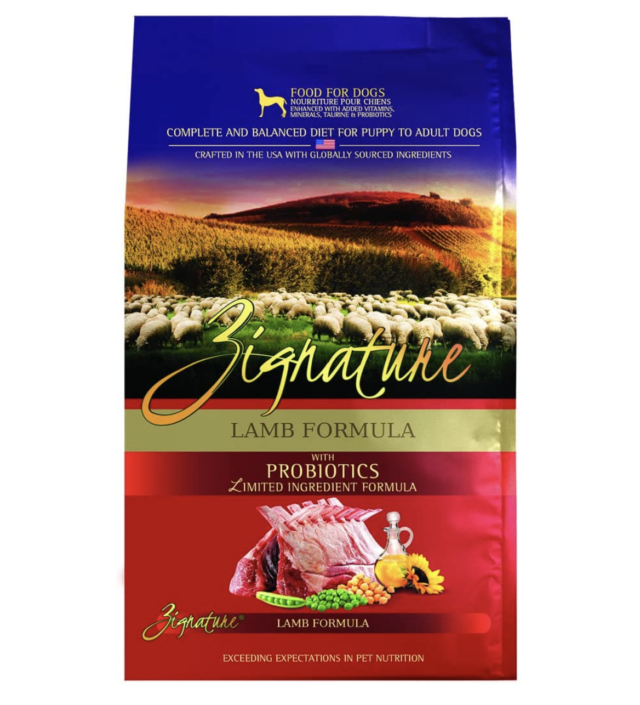


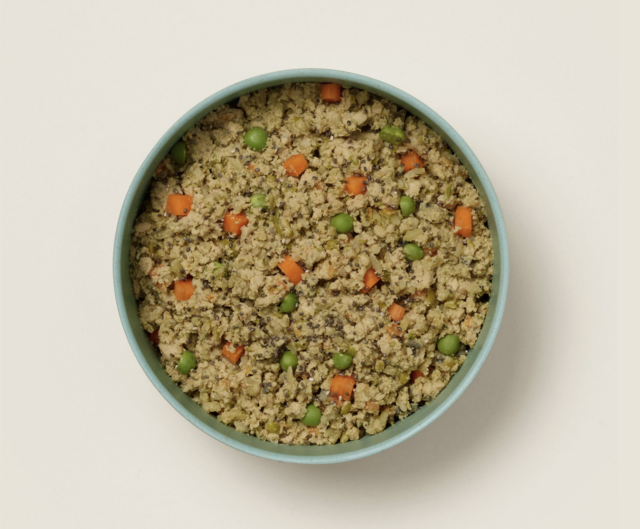
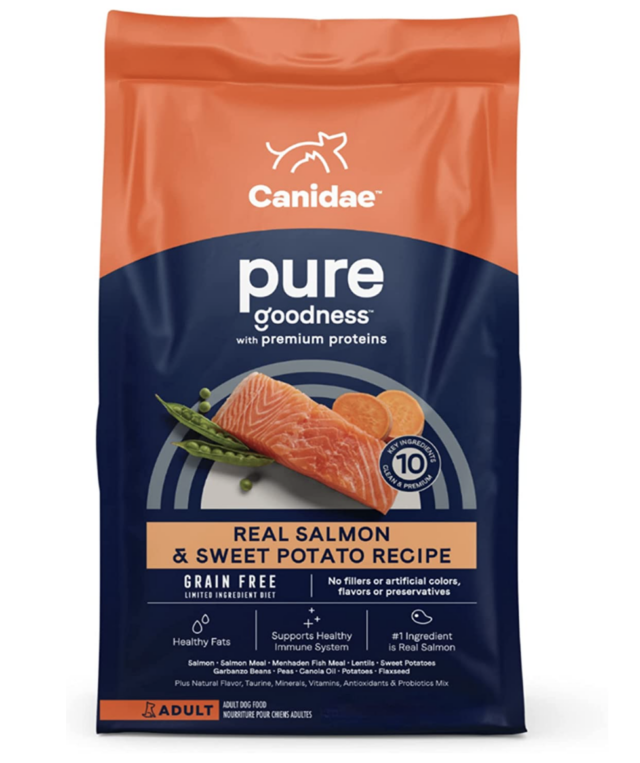
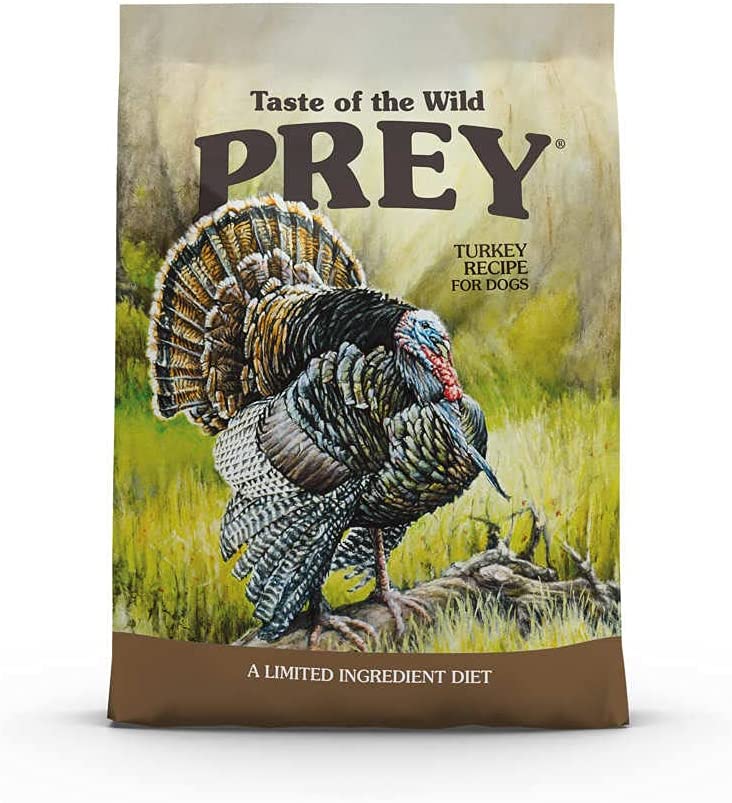
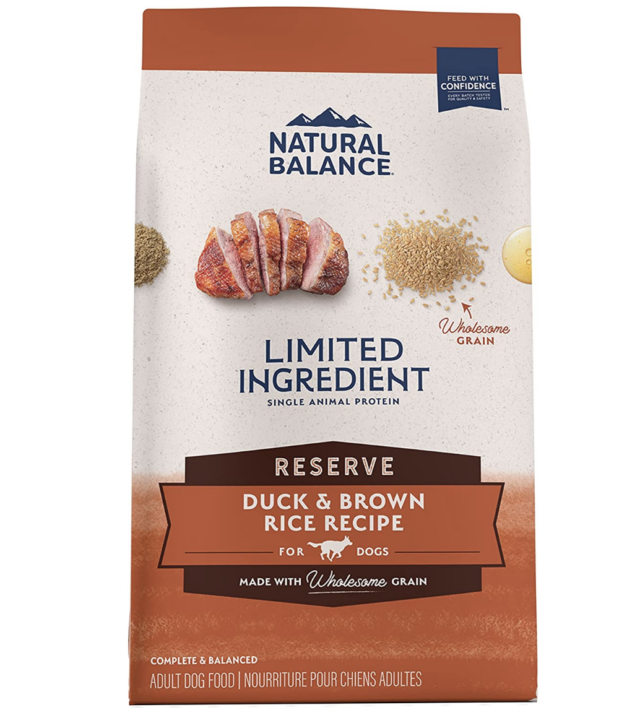
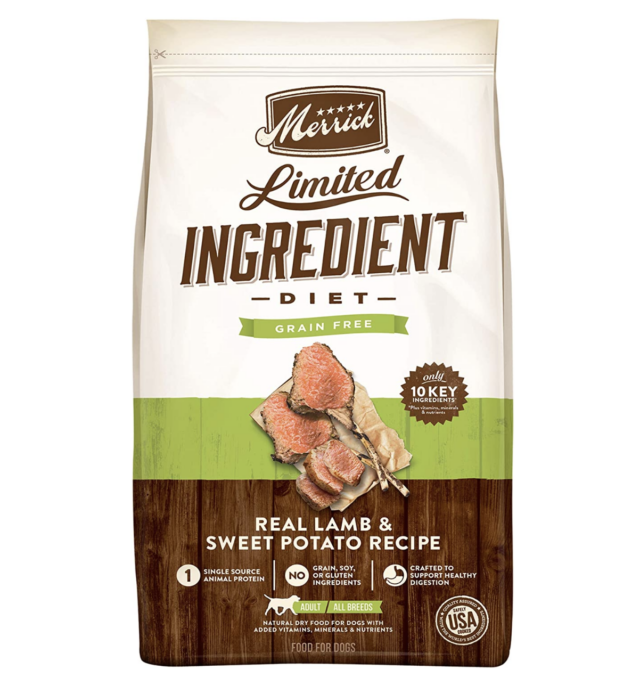
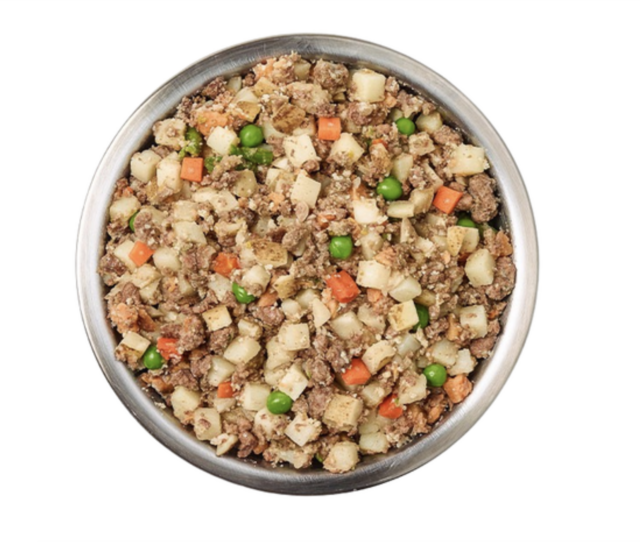
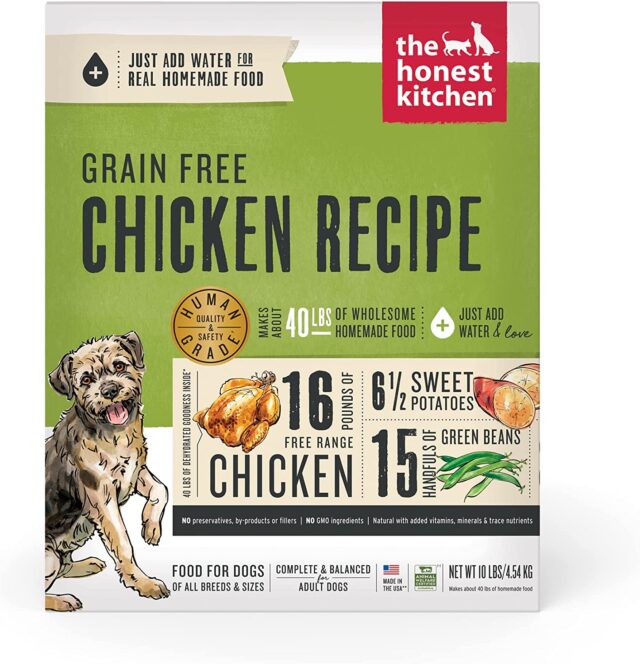
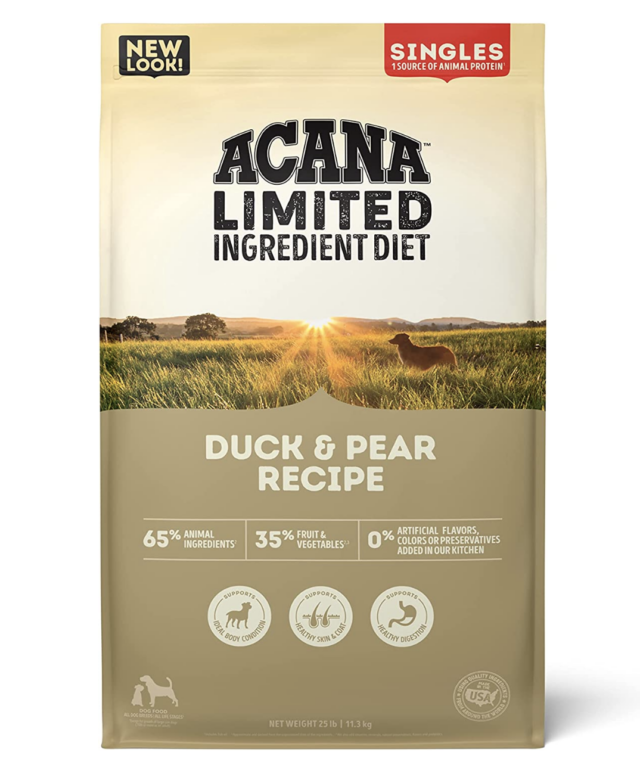
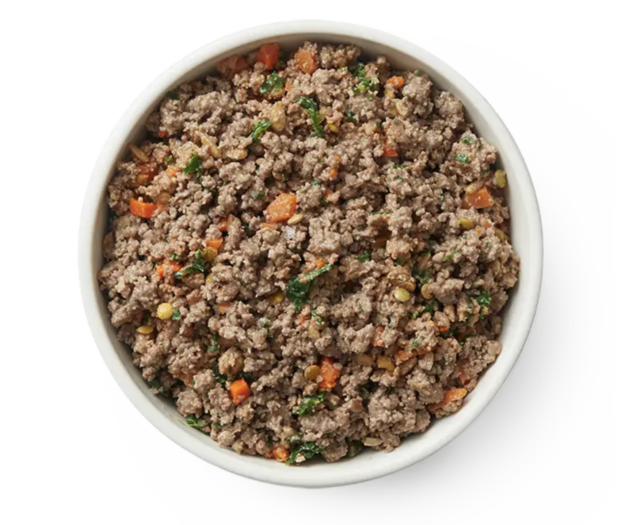
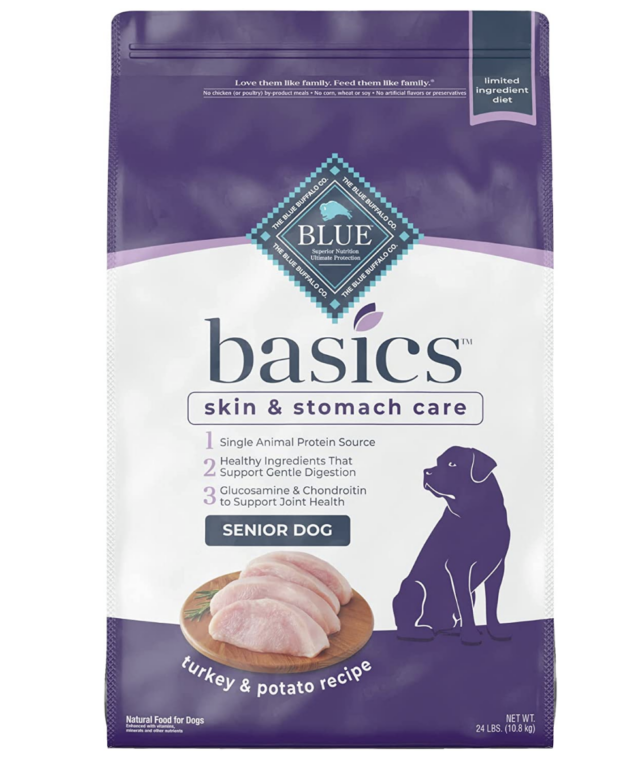
 Toledo, United States.
Toledo, United States.